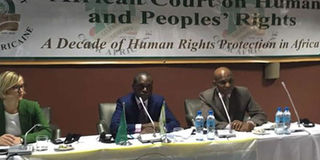African Court set to deliver 8 key judgments as sitting ends

African Court on Human and Peoples' Rights President Justice Slyvain Ore (centre) during a training for senior editors and journalists at Mount Meru Hotel in Arusha on September 8, 2016. PHOTO | LUCAS BARASA | NATION MEDIA GROUP
What you need to know:
- The court is composed of 11 judges who are nationals of the African Union's member states elected in their individual capacity.
- Six of the judgements to be delivered affects Tanzania, where individuals are accusing the state of violation of human rights.
- In a case which affects Rwanda, applicants allege that their passports were unilaterally and without notice declared invalid by the government.
The African Court on Human and Peoples’ Rights is set to deliver eight critical judgements on Thursday, at the close of its four-week sitting of the 55th Ordinary Session in Zanzibar.
The court is composed of 11 judges who are nationals of the African Union's member states elected in their individual capacity.
Eight orders are also to be signed though they will not be read out in open court:
The court meets four times a year in Ordinary Sessions and may hold Extra-Ordinary Sessions.
TANZANIA CASES
Six of the judgements to be delivered affect Tanzania, where individuals are accusing the state of violation of human rights.
In one of the cases, Mr Andrew Ambrose Cheusi was convicted and sentenced to 30 years in prison for armed robbery.
Mr Cheusi alleges that the sentence was not in force at the time he was charged so it was unconstitutional.
He also says the punishment is heavier than the penalty in force at the time the offence was committed.
RWANDA CASES
In another case, which affects Rwanda, applicants allege that their passports, as well as those of other Rwandans, were unilaterally and without notice declared invalid by the government.
The applicants allege that the invalidation of their passports came to light after one of them was informed, on applying for a visa to the United States, that his name appeared in a list prepared by the Rwandan government.
The list indicated invalidity of the passports of all people whose names appeared in it.
The cases date back to 2015.





